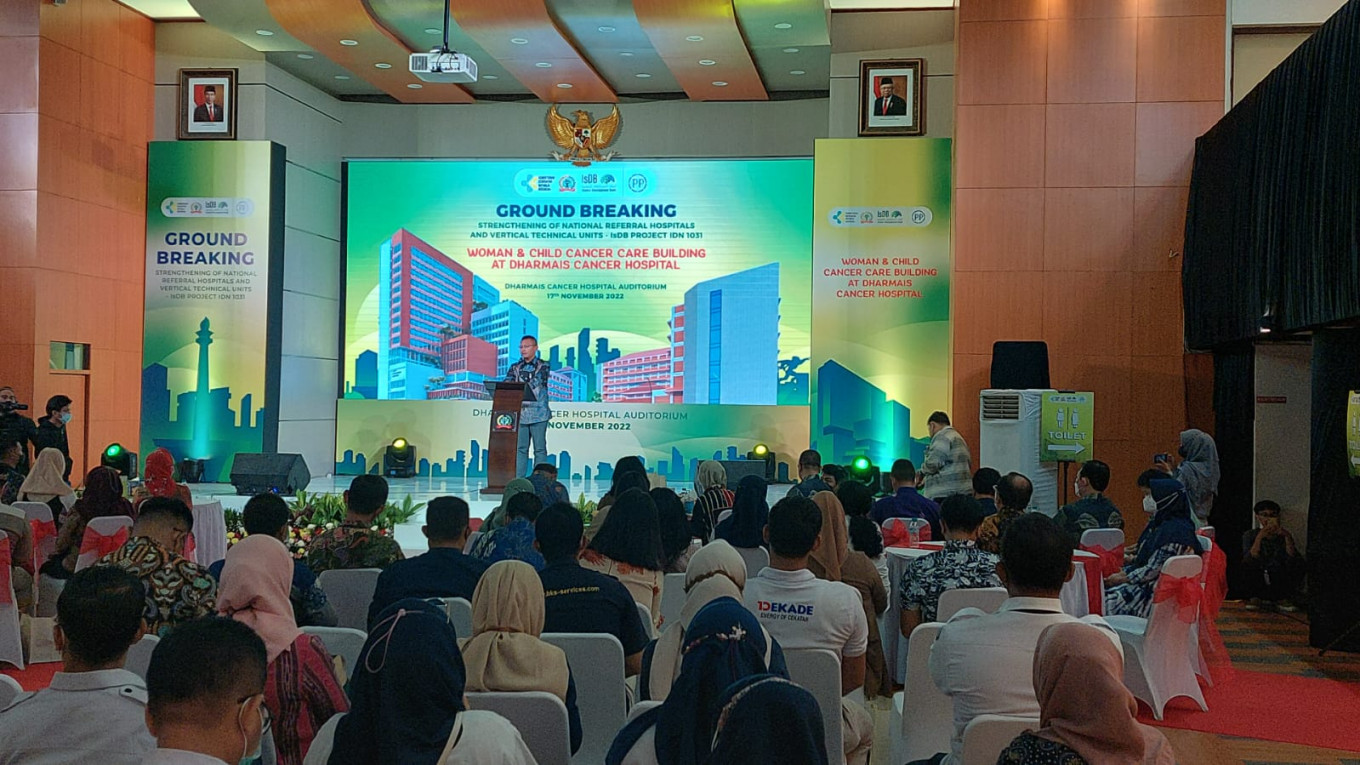Popular Reads
Top Results
Can't find what you're looking for?
View all search resultsPopular Reads
Top Results
Can't find what you're looking for?
View all search resultsDharmais Cancer Hospital Jakarta establishes Woman and Child Cancer Care Building
The project aims to make Dharmais Cancer Hospital a more reliable referral hospital in Indonesia, especially in terms of treatment for its patients.
Change text size
Gift Premium Articles
to Anyone
A
s part of the Strengthening of National Referral Hospitals and Vertical Technical Units Project Islamic Development Bank Project IDN-1031 groundbreaking program, Dharmais Cancer Hospital in Jakarta is currently undergoing building development, the updating of medical equipment, increasing its human resource capacity, as well as project management services.
The project aims to make Dharmais Cancer Hospital a more reliable referral hospital in Indonesia, especially in terms of treatment for its patients.
Dharmais Cancer Hospital is one of six hospitals involved in the project, which also includes RSUP Persahabatan in Jakarta, RSUP Dr. Hasan Sadikin in Bandung, West Java, RSUP Dr. Wahidin Sudirohusodo in Makassar, South Sulawesi, RSUP Dr. Sardjito in Yogyakarta and RSUP Prof. I.G.N.G. Ngoerah in Bali.
Dharmais Cancer Hospital is one of the technical implementation units of the Health Ministry, and is designated as the National Cancer Center with a role in providing comprehensive cancer health services, as well as functioning as a national cancer education, research, data and information center.
The establishment of the Woman and Child Cancer Care Building in Dharmais Cancer Hospital is to realize the hospital’s ideals in an effort to develop comprehensive cancer services, with a focus on excellence in the field of cancer treatment for women and children.
The project has received support from the Islamic Development Bank (IsDB), said Dharmais Cancer Hospital Organizational and General Planning acting director Anjari during the groundbreaking event.
The Strengthening of National Referral Hospitals and Vertical Technical Units project is an investment assistance project through foreign loans to increase the availability, accessibility, quality and delivery of health services through upgrading six national referral hospitals and vertical technical units.
The scope of this project includes the construction of new buildings, procurement of medical, non-medical equipment and furniture, the strengthening of hospital human resources capacity, the strengthening of hospital institutions, emergency preparedness, project management and financial audits.
The development of flagship services at Dharmais Cancer Hospital’s Woman and Child Cancer Care Building is related to its medical rehabilitation facilities, oncology Services, Center of Excellence - breast, Center of Excellence - cervical, high care unit (HCU), intensive care unit (ICU), pediatric intensive care unit (PICU), chemotherapy, and the VVIP Room among others.
Located on the west side of the hospital, the Woman and Child Cancer Care Building has a height of 76 meters, encompassing 18 floors and three basements with a total building area of 35,680 square meters.
The basic shape of the Woman and Child Cancer Care Building is inspired by women and children as well as the healing process of cancer cells, which can be seen from the different shapes of the building. The architectural concept of Woman and Child Cancer Care is inseparable from the existing hospital building, so its existence is expected to affirm the Dharmais Cancer Hospital’s status as a National Cancer Center.
In his opening remarks at the groundbreaking event in Bali, Health Minister Budi G. Sadikin said the national health development targets to be achieved by 2025 included improving the country’s public health status through increasing life expectancy, as well as reducing child and pregnant mother mortality rates.
To achieve this goal, health services in the six national referral hospitals must be strengthened in a comprehensive and integrated manner to improve access and quality of primary and referral health services.
The project also involves transformation of referral services, which will be carried out by restructuring the referral system through developing a network of national, provincial and regional referral hospitals, as well as strengthening referral management.
Currently, the development of leading hospital services is directed at nine priority types of diseases with the highest morbidity and mortality rates nationally, namely heart disease, cancer, diabetes mellitus, kidney, liver, stroke or brain conditions, maternal and child health, tuberculosis and infectious diseases.
IsDB’s support for the project is in line with the bank’s mission to reduce poverty, promote human development, science and technology, Islamic economics, banking and finance and enhance cooperation between member countries through IsDB's development partners.
The efforts are in line with the 2030 Sustainable Development Goals (SDGs), including ensuring a healthy life and supporting well-being for all for all ages by 2030, reducing the ratio of maternal mortality to less than 70 per 100,000 births and ending preventable deaths in newborns and toddlers, as well as reduce neonatal mortality to at least less than 12 per 1000 births, and under-five mortality to as low as 25 per 1000 births.
To achieve the SDG targets, various acceleration efforts are still needed. The Health Ministry’s policy is supporting this through a health service transformation, which consists of six pillars: primary service transformation, referral service transformation, health resilience system transformation, health financing transformation, health human resources transformation and health technology transformation.
“Let's prevent cancer with periodic health checks, avoiding cigarette smoke, being diligent in physical activity and exercise, having a healthy diet with balanced nutrition, getting enough rest and managing our stress levels. Even with better health facilities, prevention is the smartest thing we can do early on for the sake of ourselves and our loved ones, and for a healthier Indonesia,” Anjari concluded.










